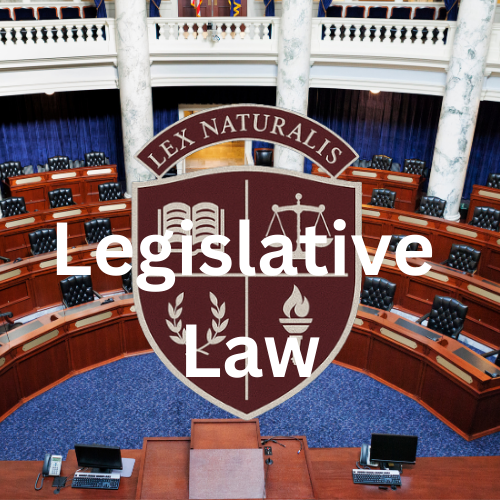The Present Jurisprudential Crisis
- Dr. Byron Gillory
- Aug 13
- 4 min read

I. The Present Jurisprudential Crisis
The twenty-first century stands at a crossroads of legal thought. Constitutional jurisprudence, once rooted in enduring principles of natural right and ordered liberty, has been progressively fragmented by competing interpretive methodologies, each vying for supremacy yet failing to deliver a coherent, universally acceptable framework. Legal positivism, once ascendant, finds itself increasingly critiqued for its moral vacuity; progressive “living constitutionalism” has, in turn, succumbed to charges of relativism and instability. Meanwhile, originalism, revived in the late twentieth century as a corrective, remains divided internally between “original intent,” “original meaning,” and “original public meaning” schools—none of which have adequately reconciled the constitutional text with enduring moral truths.
This intellectual disarray has tangible consequences. Courts, legislatures, and administrative agencies frequently legislate in moral vacuums, untethered from first principles. Rights proliferate by judicial decree, even as foundational liberties erode under the weight of regulatory expansion and emergency powers. As Chief Justice John Marshall once observed, “It is a constitution we are expounding” (McCulloch v. Maryland, 17 U.S. 316, 407 [1819]); yet modern jurists often treat the Constitution not as a fixed charter of liberty, but as pliable clay, molded to transient political passions.
The result is what scholars have termed a “crisis of legitimacy.” As Randy Barnett notes in Restoring the Lost Constitution (2004), “When courts abandon natural rights and rely solely on majoritarian will, liberty is left defenseless against the encroachments of power.” This crisis is not merely academic. It manifests in controversies over free speech, property rights, and privacy—where core liberties are compromised under the pretext of public welfare. The COVID-19 pandemic, for instance, witnessed unprecedented assertions of emergency authority: lockdowns, mandatory vaccinations, and restrictions on worship—all justified by statutory or administrative fiat, yet often lacking constitutional warrant or moral justification.
Thus arises the need for a new legal paradigm—one capable of harmonizing constitutional text with timeless principles of justice. This work proposes Constitutional Libertarianism, a jurisprudential framework grounded in natural law yet attentive to the specific architecture of the American constitutional order.
II. The Exhaustion of Competing Paradigms
A. The Shortcomings of Legal Positivism
Legal positivism, as articulated by Jeremy Bentham and John Austin, maintains that law derives solely from sovereign command, irrespective of moral content. Bentham’s famous dismissal of natural rights as “nonsense upon stilts” epitomizes this tradition. Later refined by H.L.A. Hart in The Concept of Law (1961), positivism introduced the “rule of recognition” as the criterion of legal validity—yet still severed law from morality.
While positivism offers analytical clarity, its separation thesis has proven morally hazardous. By divorcing legality from justice, positivism renders law vulnerable to tyranny so long as formal procedures are observed. The Nuremberg Trials starkly illustrated this deficiency: Nazi decrees, though “lawful” under German positivist criteria, were condemned as crimes against humanity—a judgment grounded in higher, natural principles.
American constitutionalism, though influenced by positivist elements, was never wholly positivist. The Declaration of Independence famously appeals to the “Laws of Nature and of Nature’s God,” affirming that “all men are created equal” and “endowed by their Creator with certain unalienable Rights.” Such language is irreconcilable with a purely positivist framework. As Justice Clarence Thomas has observed, “The Declaration of Independence is not a legal nullity; it is the charter of our liberties.” (McIntyre v. Ohio Elections Commission, 514 U.S. 334 [1995], Thomas, J., concurring).
B. The Relativism of Living Constitutionalism
In contrast, living constitutionalism views the Constitution as an evolving document, its meaning shaped by contemporary values rather than fixed at ratification. This approach, championed by figures such as Justice William Brennan, seeks to adapt constitutional interpretation to “the evolving standards of decency that mark the progress of a maturing society” (Trop v. Dulles, 356 U.S. 86 [1958]).
While appealing in its flexibility, this doctrine suffers from fatal indeterminacy. If constitutional meaning evolves with societal consensus, no principled limit restrains judicial discretion. Rights may expand or contract arbitrarily, depending on prevailing cultural winds. Moreover, living constitutionalism inverts the very function of a constitution: rather than restraining transient majorities, it becomes subservient to them.
The consequences are evident in modern jurisprudence. Courts have alternately expanded privacy rights (e.g., Griswold v. Connecticut, 381 U.S. 479 [1965]) and curtailed economic liberties (e.g., West Coast Hotel v. Parrish, 300 U.S. 379 [1937]), guided less by enduring principles than by shifting judicial sensibilities. This inconsistency undermines both predictability and legitimacy.
C. The Limitations of Conservative Originalism
Originalism, in its modern form, arose as a response to the perceived excesses of living constitutionalism. Figures like Antonin Scalia and Robert Bork championed a return to the “original public meaning” of constitutional text—a methodological corrective that restored interpretive discipline.
Yet originalism, as practiced, often neglects the deeper moral architecture of the Constitution. By focusing narrowly on historical semantics, it risks ossifying injustice where moral truths demand reform. As Hadley Arkes contends in Natural Rights and the Right to Choose (2002), “An originalism without moral content is no better than positivism wearing antique clothing.” Without natural law as a lodestar, originalism may preserve liberties by accident rather than principle.

Comments